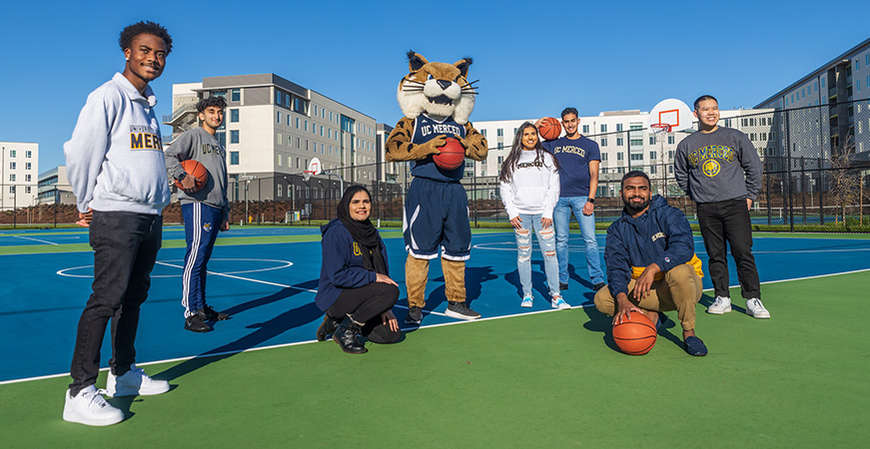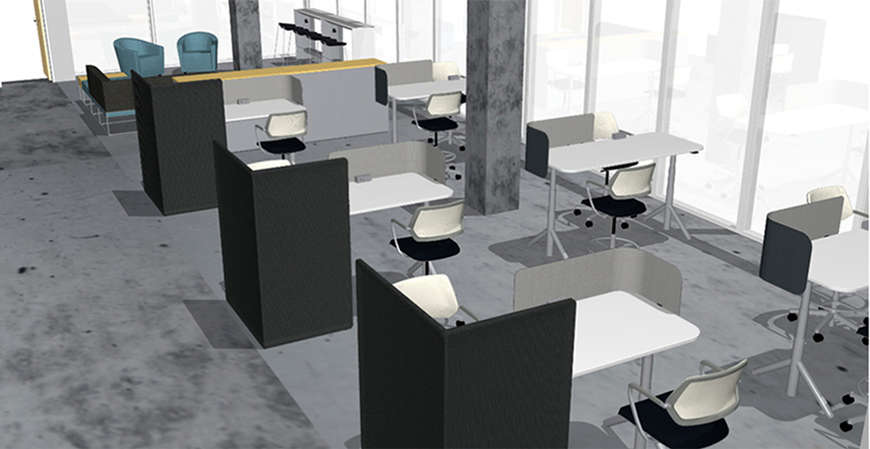
A student can swing between confidence and uncertainty in the months between signing a university’s acceptance letter and the first day of classes. The people at UC Merced entrusted with helping smooth the path for Bobcats-to-be are constantly fine-tuning the tools of a student-first support system hard-wired into the university’s identity.
Hundreds of admitted freshmen are plunging into a process still affected by the coronavirus pandemic; most check-in and community-building events still are being held virtually. But with hopeful signs that the health crisis is receding, UC Merced continues to prepare for largely in-person instruction this fall. Consequently, there are plans for spring and summer that bring incoming students and their families to campus in limited numbers and physically distanced conditions.
“One of the big things about all this is not just waiting for students to ask for help, but proactively providing that help in a way that comes from a place of care,” Admissions Director Dustin Noji said. “It’s especially important considering how intelligent they are. Many of them were at the top of their classes, so asking for help can be a difficult thing to do.”
At the heart of UC Merced’s “culture of care” is the Students First Center, a one-stop shop for information about admission, class registration, billing and financial aid. The center is not new; it was in place when the university held its first classes in 2005.
That not only sets it apart from other UC campuses, but has given staff members time to sharpen their mission of rescuing students from the angst of bouncing from one department to another to get the answers they need.
“We call this the Bobcat Shuffle,” Students First Center Director Lisa Perry said, “and we do everything we can to help students avoid it.”

Perry said she recently talked to Jane Lawrence, UC Merced’s original vice chancellor for student affairs, about the center’s origins. “She said there were two reasons,” Perry said. “One was operational efficiency. The other was to improve the student experience by providing holistic support.
“They thought, ‘You know, UC Merced is here to do things differently. And this is one way that we can break down administrative barriers, not create silos for students, and really try to help them get enrolled and just be a student.’”
The center, along with the Division of Student Affairs , uses data from the Office of Institutional Research & Decision Support to identify students who, because of their backgrounds, may need extra assistance to bridge the gap between acceptance or intent to register and those first classes. One solution is this year’s newly identified enrollment coaches, who guide these students — and their families — through everything from financial aid verification to orientation events.
“I don't think any other campus assigns an individual — a concierge service of sorts — to students,” Noji said.
Similarly, Student Affairs plans to use the data to invite these students and their families to a campus visit. In pre-pandemic days such visits were commonplace, but in the COVID-19 environment they must be limited and carefully organized, Dean of Students Jonathan Grady said.
“We know we were not necessarily going to be ready to have thousands of people in the summer. But are there opportunities to invite, say, 50 to 100 people? And what would that look like?” Grady said.
Meanwhile, Student Affairs and External Relations have launched the Drive Thru Tour, an interactive trip through campus that all students and parents can experience from their vehicles (or at home with their laptops). Student Affairs, in partnership with the Division of Undergraduate Education, is developing a Summer Edge program in which about 500 students will spend six weeks sharpening academics skills in mathematics and writing.
“We’re very intentional about our student success mission, and in providing holistic support in ways that are unique and transformative,” Grady said. His staff works hard to deliver experiences that prompt not just academic growth, but personal and career development.
“The ability to do all three and do them well is unlike other campuses. I think that’s a defining point,” Grady said.
One of the big things about all this is not just waiting for students to ask for help, but proactively providing that help in a way that comes from a place of care.
Angie Colin Jacobo knows what it’s like to prepare for university life amid a worldwide health crisis. As an incoming student in 2020, she joined — virtually — one of the university’s Living Learning Communities (LLC). The experience inspired her to expand her Bobcat pawprint during fall semester.
“I joined several clubs, which taught me how to enhance my time-management skills,” said Colin Jacobo, a political science major, “and I made more connections with people.”
Another sophomore-to-be this fall, Brandon Lopez, made connections to UC Merced in 2020 by joining the Yosemite Leadership Program and the Leadership and Service LLC. “UC Merced always felt like a welcoming place,” said Lopez, a mechanical engineering major. “I think the fact that diversity is such an important topic here makes the campus much more inviting.”
Meanwhile, the Students First Center continues to reach out , using whatever digital avenues work best, and offers several ways for students to make contact. Emails always will be a primary tool, but text messages are especially effective for younger recipients. Noji said the center has also seen an increased response to phone calls.
“People were just excited that somebody reached out to them personally,” he said. “Maybe that's because of COVID, I don't know, but it was definitely a change.”
When the university can ramp up on-campus activity, students will find a revamped Students First Center at its home in the new Administration Building. Taking lessons about guest service refined at Disney amusement parks, the center’s design eschews lines and stanchions in favor of tables where students will meet one-on-one with a team member. Students will “queue up” via a mobile app and be notified when it’s time to come in.
The efforts by the jacks of all trades at the Students First Center dovetail with Student Affairs’ work to virtually connect incoming students with current Bobcats of similar backgrounds, such as first-generation students and those from marginalized populations. Grady said his team is a making plans for a Welcome Week in August that celebrates not just newcomers but second-year students who were unable to enjoy a full welcome last year.






